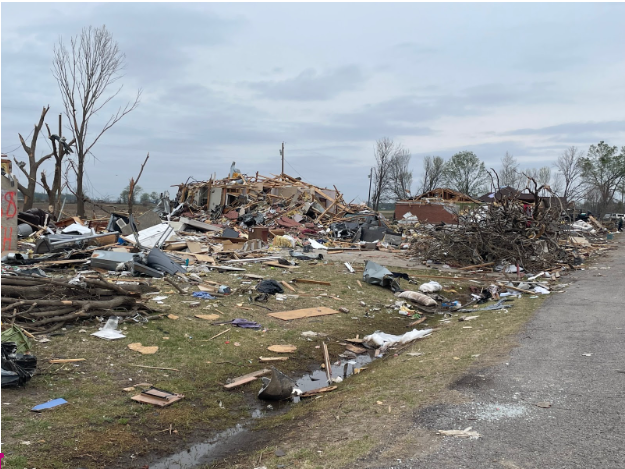Devastation in Rolling Fork
One the many sites of destruction in a small Rolling Fork neighborhood. Almost every house on this street was completely leveled.
Soft rain fell from a gray sky onto a mass of destruction on April 14th. Bent metal, splintered wood and entire vehicles littered the ground of Rolling Fork, Miss.
On the playground of South Delta Elementary School, the tornado ripped two massive oak trees from the ground like weeds and toppled them over into the grass. It took half of the school’s roofing and flung it all over the grounds where children had played just under a month ago. Just down the street from the school, the storm swiped entire buildings from the spot where they had been standing. Only the foundations remain.
On the night of March 24th, a tornado nearly half a mile wide tore through the Mississippi Delta. A small town only an hour from our campus has experienced death, destruction and immense grief ever since.
Picking Up the Pieces
I was able to see these scenes first hand on Thursday, April 14th. I was a part of a cleanup effort that involved the entire Delta State football team. Our main objective was to simply clear South Delta Elementary School playground of debris and a large portion of two oak trees that had fallen.
Samaritan’s Purse, an Evangelical-Christian group, organized this all-day affair. Samaritan’s Purse provides help to people all throughout the South and Midwest who have experienced some sort of natural disaster, often large tornados.
They had around ten volunteers, men and women, participating in the cleanup at the school with us. Some of these volunteers operated chainsaws for hours on end, while others joined us in hauling branches and logs to the street in front of the school.
Members of this group have been in Rolling Fork for weeks now, and seemed especially grateful to see such a large work force strolling in ready to help. With the merging of almost the entirety of the Delta State football team and the Samaritan’s Purse volunteers, there were close to one hundred people laboring in the school yard that day.
We also had the opportunity to meet some of the employees of the school. They told us that elementary students of South Delta have not attended school since the incident with the tornado almost a month ago and were nothing short of ready for things to return to normal. They still needed some things out of their rooms that were located in the damaged section of the school where roofing was missing.
After it was all over, volunteers carved up the majority of those large trees and moved them to an area by the road for pick-up. They also picked up much of the roofing and tiling the storm ripped from the building. While we made progress on the playground of South Delta Elementary school, a large chunk of Rolling Fork remains in ruin.
How Will Rolling Fork Recover?
Often after devastating natural disasters like this, the immediate response is immense. We see it constantly in the news cycle. There are thoughts and prayers sent through social media or other forms of communication. Perhaps even a large-scale politician, like the president, will visit the affected area.
All of these things happened in Rolling Fork. Nevertheless, the further away from the event, the less people outside of the community talk or think about it. The sad reality of this situation is that some of the things that were destroyed in Rolling Fork will likely never return.
The Mississippi Delta is a region that exists in a state of poverty. An article from the Associated Press points out this fact. Pettus, Bumstead, and Santana write: “Mississippi is one of the poorest states in the U.S., and the majority-Black Delta has long been one of the poorest parts of Mississippi.”
In this article, the authors provide statistics and poverty rates of Rolling Fork’s Issaquena County and other surrounding counties. High poverty rates contribute to the gravity of a natural disaster in regions like this.
The authors interviewed a middle-aged man who survived the tornado by hunkering down in the laundry room with his wife. The storm leveled the house, but the couple survived. However, the man is unsure how he will go to work as the storm also destroyed his vehicle.
The U.S. government designed the Federal Emergency Management Agency, FEMA, for crises such as this in Rolling Fork. However, this does not guarantee that everything that was destroyed will be replaced, especially if a person’s property is uninsured.
In recent natural disasters, the main issue with people receiving money to rebuild has been lack of registration. According to the Associated Press, the FEMA registration process is extremely long and tedious, and it is also online. So, in an area without much internet access and high levels of poverty, this could be extremely difficult.
Moving Forward
There are still places and lives that need to be rebuilt. People who were lucky enough to survive this catastrophe lost their homes, their schools and in some cases their livelihoods. However, there are places in Rolling Fork that stood for decades and now will never return.
There are still families that live in this area who are determined to build it back. There are still children and teenagers who are in need of an education. There are still others who will eventually return to their jobs. The essential question is, what will the families who were surviving paycheck to paycheck do? How will they survive in an area where they can no longer work or live?

Charlie Lott is in his junior year and an English education major. He is interested in writing about sports and human interests. He attended four high...



